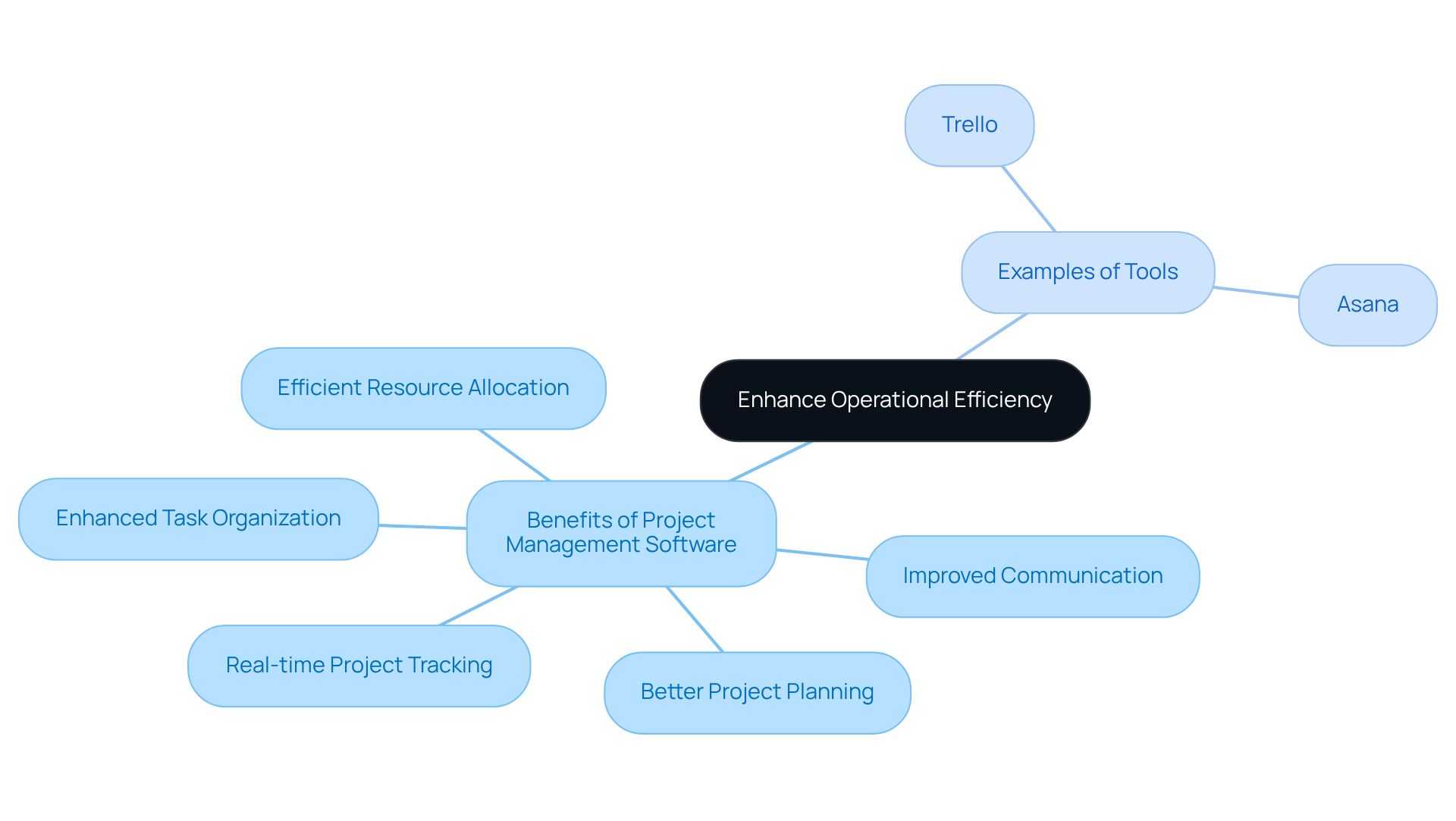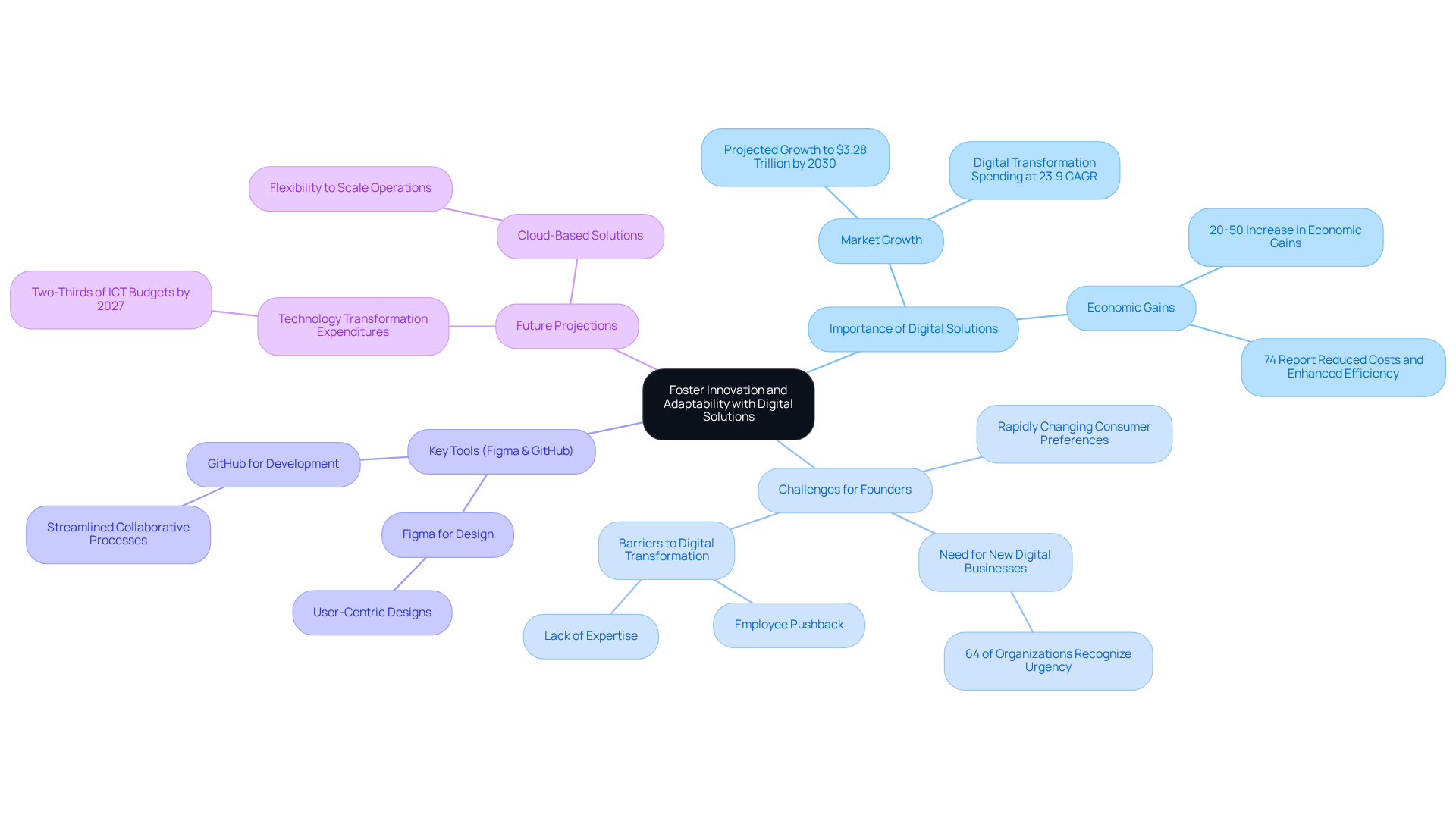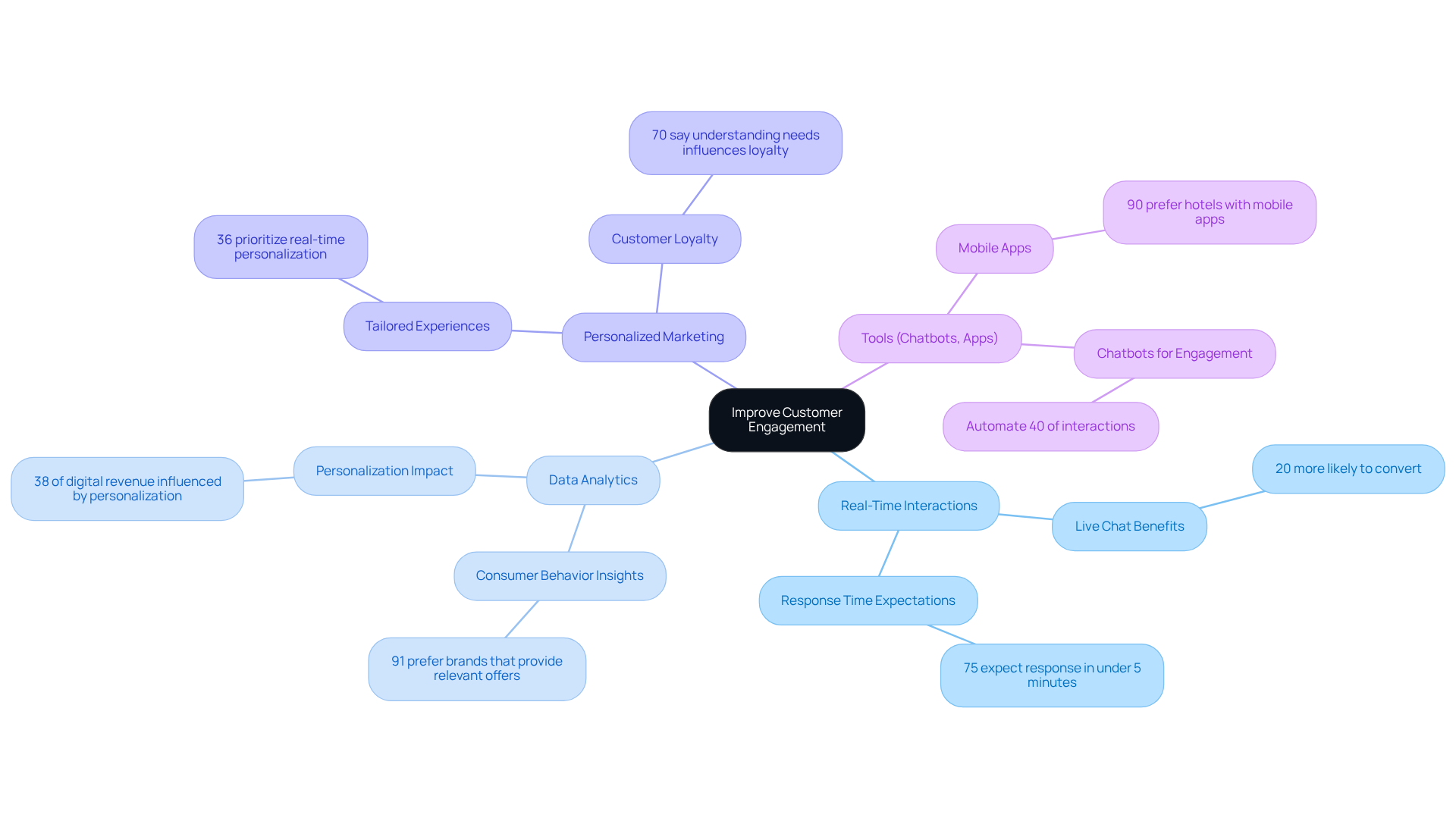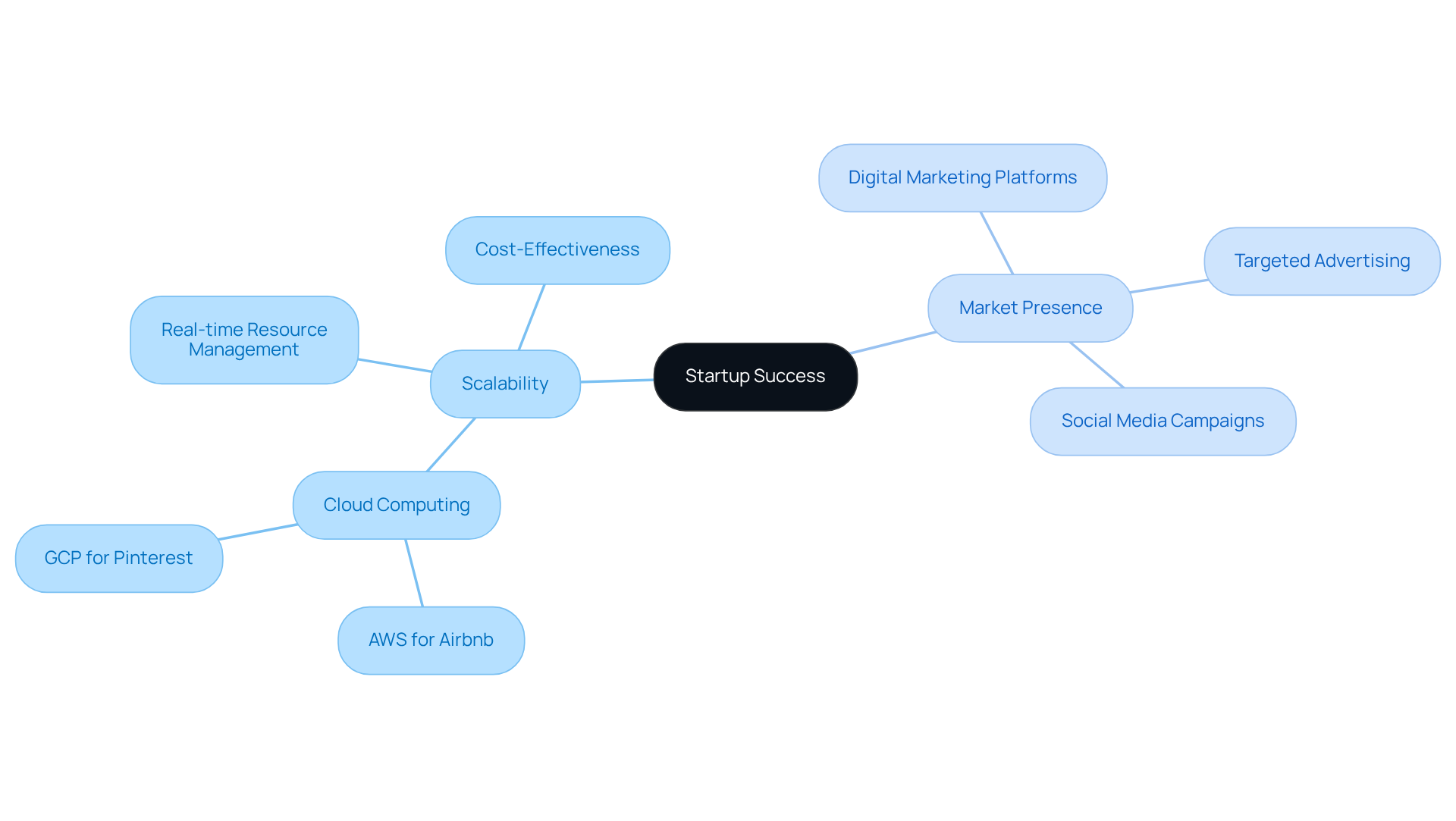Overview
For many startup founders, the journey can often feel overwhelming. The challenges of operational efficiency, innovation, and customer engagement weigh heavily on their shoulders. It's not just about building a business; it's about connecting with people and making a meaningful impact. This is where apps and platforms come into play, offering essential support that can transform these challenges into opportunities.
These digital tools automate tasks, making daily operations smoother and freeing up valuable time for creative thinking. They facilitate collaboration, allowing teams to work together seamlessly, even from afar. Moreover, they provide crucial insights into consumer behavior, enabling startups to adapt quickly to market demands.
By leveraging these resources, founders can foster innovation and build deeper connections with their audience. Ultimately, embracing these technologies can lead to a more fulfilling and successful startup experience. Together, we can navigate this journey, turning obstacles into stepping stones for growth and connection.
Introduction
Navigating the startup landscape can feel overwhelming, especially when striving for operational efficiency and nurturing innovation. Many new ventures find themselves wrestling with the complexities of resource management and the need to adapt to ever-changing market demands. In this context, the strategic use of apps and platforms can be a transformative solution. These digital tools not only simplify operations but also foster deeper customer engagement and scalability, setting the stage for success.
However, it’s important to recognize that the very tools meant to support growth can sometimes lead to confusion or stress. The key is to understand how to use these resources effectively, unlocking their full potential and easing the journey ahead.
Enhance Operational Efficiency Through Apps and Platforms
In today’s fast-paced business environment, many startups face the challenge of achieving operational efficiency. It can feel overwhelming when juggling multiple tasks and trying to keep everything on track. Fortunately, apps and platforms act as essential tools that can automate routine tasks, manage workflows, and enhance communication. Take project management applications like Trello or Asana, for instance; they empower teams to collaborate effortlessly, helping ensure projects stay on schedule and deadlines are met. By embracing these digital solutions, new businesses can significantly reduce manual errors, cut down on time spent on administrative tasks, and concentrate on what truly matters—their core business activities by utilizing apps and platforms. In fact, a remarkable 54% of professionals report that using automation resources within project management software saves them over five hours each week, underscoring the substantial efficiency improvements that are within reach.
Moreover, apps and platforms that integrate various functions—such as CRM systems that blend sales, marketing, and customer service—enable startups to operate more cohesively. This cohesion leads to better resource allocation and enhanced productivity. The five key benefits of project management software encompass:
- Better project planning
- Improved communication
- Enhanced task organization
- Efficient resource allocation
- Real-time project tracking
This operational efficiency is not merely a luxury; it’s a necessity for survival in a competitive landscape where every second counts. As Bill Gates wisely noted, "Automation applied to an efficient operation will magnify the efficiency," which highlights the essential role of effective project management resources. It’s important to recognize that organizations waste 12% of their valuable resources due to ineffective project management. This reality emphasizes the need for new businesses to to thrive. Successful ventures, like those utilizing apps and platforms such as Trello or Asana, showcase the tangible benefits of these solutions, reinforcing the idea that effective project management is crucial for innovation and growth. Remember, you’re not alone in this journey; many have walked this path and found success through the right tools and support.

Foster Innovation and Adaptability with Digital Solutions
Innovation is truly the lifeblood of any new venture, and embracing technological solutions is essential for nurturing this creativity. Many founders face the challenge of rapidly changing consumer preferences, which can feel overwhelming. Did you know that 64% of organizations recognize the urgent need to establish new online businesses just to stay competitive? This reality can weigh heavily on startup founders. However, there is hope. Rapid prototyping apps and platforms, such as Figma for design and GitHub for software development, can empower you to swiftly test ideas and iterate based on real-time feedback. This agility is crucial in a market that demands quick adaptation.
Moreover, as we look ahead, technology transformation expenditures are projected to account for possibly two-thirds of all ICT budgets by 2027. This underscores the increasing importance of these resources in your journey. Cloud-based apps and platforms offer new businesses the flexibility to scale operations without the burden of heavy infrastructure costs, allowing for a more efficient allocation of resources. By adopting these technological tools, you not only keep pace with industry shifts but also position yourself as a pioneer in innovation, distinguishing yourself from competitors who may struggle to adapt.
Successful examples abound, with companies utilizing Figma to create user-centric designs that enhance engagement and employing GitHub to streamline collaborative development processes. It’s inspiring to see organizations that invest in digital transformation report a 20-50% increase in economic gains when focusing on client experience. This focus ultimately drives their , and it can drive yours too. Remember, you are not alone on this journey; there are resources and communities ready to support you every step of the way.

Improve Customer Engagement and Experience via Digital Platforms
Client interaction is crucial for new businesses striving to cultivate a loyal clientele. Many startups face the challenge of effectively engaging with their audience, often feeling overwhelmed by the vast digital landscape. Fortunately, apps and platforms, including social media and eCommerce sites, offer invaluable tools for fostering real-time interactions. For example, utilizing chatbots on websites can significantly enhance service by providing immediate responses to inquiries, which in turn boosts user satisfaction. It’s heartening to note that individuals who engage with businesses through live chat are 20% more likely to convert, and web leads are nine times more likely to convert if they receive follow-up within five minutes. This highlights the transformative power of prompt support in nurturing client relationships.
Moreover, data analytics tools empower new businesses to gather insights into consumer behavior, paving the way for personalized marketing strategies that resonate with their target audience. A recent report reveals that 91% of consumers are more inclined to shop with brands that acknowledge and deliver relevant offers. This underscores the importance of in building meaningful connections. Additionally, 36% of company respondents prioritize providing customized experiences in real-time, emphasizing the critical role of personalization in client engagement strategies.
As branding expert Mareen Cherian wisely states, "If you’re not constantly listening and constantly ready for change, you’re going to miss the opportunity." By embracing these apps and platforms, new businesses can foster significant interactions that not only enhance client experiences but also nurture brand loyalty and inspire repeat transactions. In conclusion, the pivotal role of chatbots and apps and platforms in enhancing customer engagement empowers new businesses to meet and exceed the ever-evolving expectations of their clientele.

Leverage Scalability and Market Presence for Startup Success
Scalability can often feel like a daunting challenge for new ventures, as the pressure to grow without incurring significant resource costs can weigh heavily on founders. The good news is that apps and platforms, particularly cloud computing services, provide a nurturing solution that allows businesses to expand their IT infrastructure as needed. This adaptability not only promotes growth but also alleviates the burden of high initial expenses. Imagine being able to adjust your computing resources in real-time, effortlessly managing increased workloads without the stress of maintaining physical servers. This flexibility is vital, especially when considering that 50% of organizations are now operating their workloads in public cloud environments—a clear indication of the shift towards cloud adoption.
Moreover, digital marketing platforms play a crucial role in enhancing a new business's market presence, enabling connections with a global audience. Through and engaging social media campaigns, startups can penetrate new markets and attract a diverse range of customers. This approach not only fosters immediate growth but also lays the groundwork for long-term success in an increasingly competitive landscape. Industry leaders advocate for the importance of cloud computing apps and platforms for new businesses, emphasizing their ability to facilitate swift and cost-effective innovation, ultimately propelling their growth trajectory.
There are numerous success stories to inspire you: consider how Airbnb harnesses AWS to manage its extensive database and high traffic volumes, ensuring a seamless booking experience for users. Similarly, Pinterest has effectively utilized Google Cloud Platform to handle vast amounts of user-generated data, providing personalized recommendations that enhance user engagement. These examples vividly illustrate how apps and platforms not only support scalability but also boost operational efficiency, allowing startups to focus on what truly matters: innovation and agility in their respective markets.

Conclusion
In today's competitive business landscape, startups often face the daunting challenge of standing out and thriving. Embracing apps and platforms is not merely a choice; it’s essential. These digital tools can significantly enhance operational efficiency while fostering innovation, improving customer engagement, and supporting scalability. By integrating technology into their operations, new ventures can streamline workflows, adapt quickly to market changes, and build strong relationships with their clients. This ultimately positions them for long-term success.
Consider the many benefits that utilizing apps and platforms can bring:
- From project management tools that enhance collaboration and task organization to customer engagement solutions that personalize interactions, each aspect plays a crucial role in a startup's ability to operate effectively.
- The importance of scalability through cloud computing and digital marketing strategies further underscores the necessity of these resources.
- They are vital in navigating growth challenges and expanding market presence, which can often feel overwhelming.
Ultimately, the integration of digital solutions transcends being just a trend; it is a vital strategy for fostering adaptability and innovation in startups. As the business environment continues to evolve, leveraging the right technology empowers entrepreneurs not only to meet the demands of their customers but also to exceed expectations. Startups are encouraged to invest in these tools and embrace the opportunities they present. By doing so, they can ensure their place in an increasingly digital future, creating a supportive community that thrives together.
Frequently Asked Questions
What is the primary challenge faced by startups in achieving operational efficiency?
Startups often struggle with juggling multiple tasks and keeping everything on track in today's fast-paced business environment.
How do apps and platforms help startups improve operational efficiency?
Apps and platforms automate routine tasks, manage workflows, and enhance communication, allowing startups to focus on their core business activities.
Can you provide an example of project management applications?
Examples of project management applications include Trello and Asana, which enable teams to collaborate and help ensure projects stay on schedule.
What percentage of professionals report time savings from using automation in project management software?
A remarkable 54% of professionals report that using automation resources within project management software saves them over five hours each week.
What are the five key benefits of project management software?
The five key benefits are better project planning, improved communication, enhanced task organization, efficient resource allocation, and real-time project tracking.
Why is operational efficiency essential for startups?
Operational efficiency is crucial for survival in a competitive landscape where every second counts, as ineffective project management can lead to wasted resources.
What does Bill Gates say about automation and efficiency?
Bill Gates stated, "Automation applied to an efficient operation will magnify the efficiency," highlighting the importance of effective project management resources.
What impact can ineffective project management have on organizations?
Organizations waste 12% of their valuable resources due to ineffective project management, emphasizing the need for startups to adopt effective tools.
What do successful ventures using apps like Trello or Asana demonstrate?
Successful ventures showcase the tangible benefits of using these solutions, reinforcing the idea that effective project management is crucial for innovation and growth.




